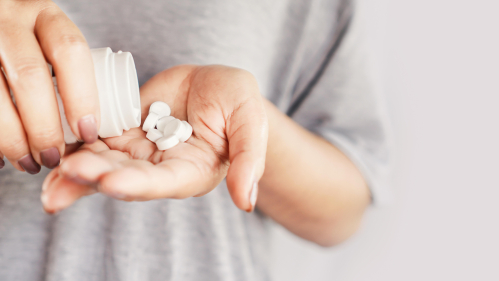Taking Acetaminophen to Curb Flu Symptoms? Take Care Not to Overdose.

New Jersey Poison Control Center experts warn that too much of the drug can be toxic
Over a two-day period in January, the New Jersey Poison Center assisted in the medical care of several New Jersey patients who accidentally took too much acetaminophen while treating flu-like symptoms.
Each patient is receiving antidotal therapy to prevent liver failure and death.
“Cold and flu season is the time of year when we see an uptick in calls at the Poison Control Center related to the overuse of acetaminophen to alleviate flu-like symptoms,” said Diane Calello, executive and medical director of the New Jersey Poison Control Center at Rutgers New Jersey Medical School. “Most people don’t realize they’re at risk of overusing acetaminophen because they’re unaware so many medicines contain this ingredient. There are more than 600 products on the market that contain acetaminophen.”
Overdoing it is much easier than most realize, and the consequences of taking too much acetaminophen can happen quickly and lead to a life-threatening emergency like severe liver damage and liver failure, kidney failure and death.
Bruce Ruck
Managing Director, New Jersey Poison Control Center
Acetaminophen – the active ingredient in Tylenol and many prescription pain medicines and over-the-counter (OTC) cough, cold and fever-reducing products – is safe and effective when used carefully and correctly and not more than the maximum recommended daily limit of 4,000 milligrams of acetaminophen.
However, taking too much acetaminophen, either alone or in combination with other medicines, can lead to serious health effects.
“Overdoing it is much easier than most realize, and the consequences of taking too much acetaminophen can happen quickly and lead to a life-threatening emergency like severe liver damage and liver failure, kidney failure and death,” said Bruce Ruck, managing director of the New Jersey Poison Control Center.
“We want to stress that adults should never take more than the maximum daily limit of 4,000 milligrams of acetaminophen per day from all medicines combined in a 24-hour period,” Calello said. “It’s also important to make sure you’re not taking multiple doses of acetaminophen too close together as this can also lead to overdose and liver damage.”
Infants and children also are at risk of accidental acetaminophen overdose as many children’s products contain acetaminophen. It takes much less acetaminophen to cause serious health effects in children.
“When giving medicine to children, especially young children, give the amount of medicine recommended for their weight, not their age,” Ruck said.
“We realize most people aren’t aware of the harm that can result from overusing acetaminophen, so we’re raising awareness to prevent accidental overdoses,” Calello said. “We want people to be aware of the risks and to know how to use acetaminophen safely.”
Follow these steps to prevent overusing acetaminophen:
- Choose targeted products: Only use medicines designed to treat your symptoms.
- Check the active ingredients: Review the active ingredients in all the products you’re using to avoid doubling up on ingredients, especially acetaminophen. Be mindful of the total milligrams of acetaminophen you consume from all sources in 24 hours. Do not exceed the recommended daily dose.
- Avoid combining medicines and products: Don’t take more than one OTC product containing acetaminophen at the same time or within a short period of time.
- Follow the directions on the label: Carefully read the warnings and dosing directions on the label, insert or product packaging before taking or giving medicine.
Although acetaminophen overdose is one of the most common poisonings, recognizing symptoms is often difficult. Not only can symptoms be vague — loss of appetite, nausea, stomach pain, and vomiting — symptoms do not always appear within 24 hours. Some people may not experience symptoms for a few days, and by then symptoms are life-threatening.
If you suspect you have used too much acetaminophen, calling the New Jersey Poison Control Center is the quickest way to get the medical help you need. The poison center’s specialists are available 24/7. Anyone can call for medical help – children, teenagers and adults.
Poison control centers are a medical resource for the public and healthcare providers. Get help 24/7: Call the Poison Help line at 1-800-222-1222 or start an online chat. If someone isn’t breathing, is having difficulty waking up or having a seizure, call 9-1-1.


